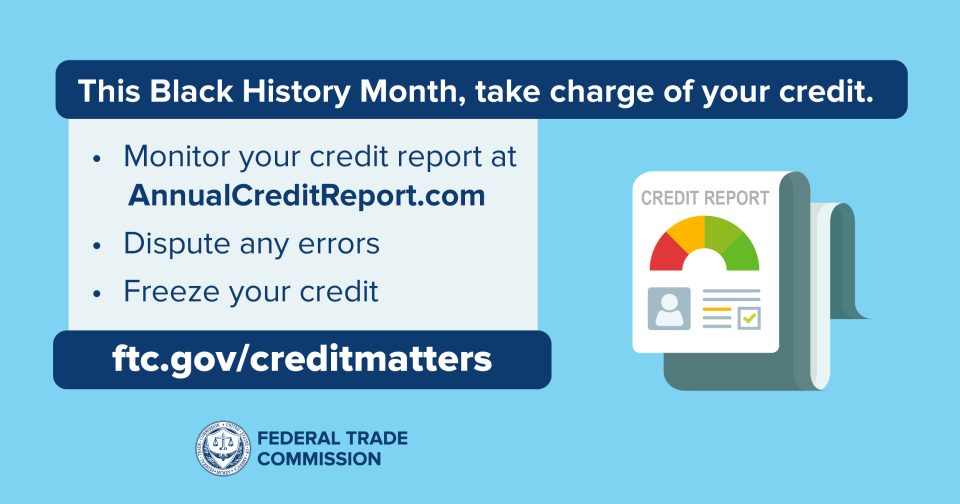The FTC honors the contributions and legacy of Black Americans across U.S. history. One of the top consumer issues we’ve heard from people living in majority Black communities is related to credit bureaus. Your credit history tells businesses and potential employers a story about how you use money. What is your credit history saying about you — and is it accurate?
Businesses might run your credit report to decide if they want to lend you money, give you a credit card, or rent you an apartment. You could pay more for things like a loan or even utility services if the report shows that you pay your bills late or take on more debt than you can afford to pay back. Sometimes that information is accurate — but sometimes it’s not. Take charge using these steps to manage and protect your credit:
- Monitor your credit regularly. Through December 2023, get a free copy of your credit report from the three credit bureaus — Equifax, Experian, and TransUnion — every week if you want. But even if you just do it yearly, look closely for problems or mistakes, like someone else’s information, payment history or account information that’s wrong, or accounts that you didn’t open yourself.
- Dispute errors right away. If you find mistakes, dispute them with each credit bureau that has the mistake and the company that reported the incorrect information. Both parties have to investigate your claim and correct the information if they find that it’s inaccurate. If you find accounts you didn’t open, it could be identity theft. Go to IdentityTheft.gov to get a free personal recovery plan that walks you through each step, including getting fraudulent information removed (or “blocked”) from your credit report.
- Place a credit freeze. One way to help protect against identity theft or misuse after a data breach is to freeze your credit report. That limits access to your credit and makes it hard for someone to open new accounts in your name. And you can do this (for free) even if your identity hasn’t been stolen.
Share this information with someone in your family, faith community, or social organization and check out ftc.gov/creditmatters to learn more about understanding your credit.


I am interested
How do we get a copy of our credit report and how often?
This is so poorly captioned -- Black people are not the only ones subjected to this and we certainly should never wait for a particular "month" to do it. I know you meant well, but I find this insulting on so many levels.
hello
I would like, and yes I believe Credit reporting agencies are not up to par and should be over haul immediately. I have experienced Equifax breach in 2017 to the extent that I had to write creditor requesting each to close all of my credit cards and File Chapter 13, because of their lax security/consumer privacy information. Today, Equifax after two requests 7 months ago to please up their records to report that the Bankruptcy was Successfully Discharged over 8 months ago May 2022, Equifax has updated this information to not include that the Chapter 13 was discharged, however, reports it as updated information and gives the appearances of a brand New Bankruptcy as of 2023.
The Equifax company’s conduct is extremely out of order, subjective and extremely misleading with adverse effects to the collective credit reporting standards and consumer files. Their handling of such critical information about consumers should be a much easier process to correct, however it Is. Not.
In reply to I would like, and yes I… by Doris A Stevenson
You can send a complaint about a credit reporting agency to the Consumer Financial Protection Bureau at https://www.consumerfinance.gov/complaint/
In reply to I would like, and yes I… by Doris A Stevenson
A Bankruptcy Chapter 7 or 13 will stay in your credit file for 10 years with derogatory remarks to your credit. I'm sorry about that, but you can build new credit on a pay as you go credit card which will allow you to put money in a savings account and you can earn more credit with time.
Also have your phone and utility bill reported to your credit agencies and this will build you a credit score. Pay everything on time, don't let anyone get you off your credit building skills and in 10 years I guarantee that you will be able to pay you a home that you can afford. Remember to buy within your means. Good luck.
Hello ftc.gov owner, Your posts are always a great source of information.